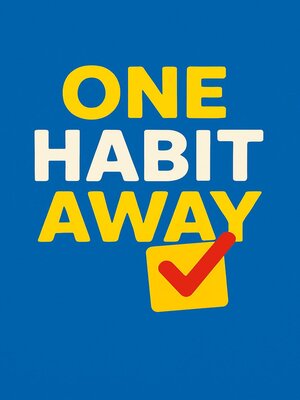
Sign up to save your library
With an OverDrive account, you can save your favorite libraries for at-a-glance information about availability. Find out more about OverDrive accounts.
Find this title in Libby, the library reading app by OverDrive.



Search for a digital library with this title
Title found at these libraries:
| Library Name | Distance |
|---|---|
| Loading... |
One Habit Away" delivers a powerful but simple message: you don't need to change your whole life at once — you just need to master one meaningful habit at a time. By focusing on a single, well-designed habit, you make transformation realistic, sustainable, and deeply personal.
Core idea: Real change doesn't come from motivation bursts or huge goals; it comes from small, consistent actions that reshape your identity over time. The author emphasizes that willpower alone isn't enough — what truly works is creating a system that makes consistency inevitable.
The book begins by explaining why most new habits fail: people rely too much on short-term motivation, set vague or overly ambitious goals, and view small failures as total defeat. Instead, the author proposes narrowing focus to one small, clearly defined habit — like walking for 10 minutes or reading one page a day — while allowing flexibility and self-compassion.
One of the central principles is "small habits and compound growth." Like compound interest in finance, a 1% improvement each day adds up exponentially over time. Small habits bypass resistance, feel effortless, and gradually build unstoppable momentum.
The book highlights the importance of choosing the right habit — a "keystone habit" that positively influences multiple areas of life. For example, regular exercise can boost energy, mood, and focus, creating a ripple effect. What matters is not perfection, but personal meaning and sustainability.
Another key idea is the Two-Minute Rule: any new habit should start with a version that takes less than two minutes to complete. The goal isn't immediate mastery, but establishing the rhythm of showing up every day. Once you've built consistency, you can scale up naturally.
The author introduces habit anchoring, which means linking your new habit to something you already do — like meditating after brushing your teeth or journaling right after your morning coffee. Anchoring turns new behaviors into automatic routines.
Social support is another pillar of habit success. Surrounding yourself with people who share your goals or hold you accountable increases the likelihood of staying on track. The book encourages creating a positive environment that supports progress instead of sabotaging it.
When setbacks happen (and they always do), the book teaches the "Never Miss Twice" rule — missing a habit once is fine, but missing twice starts a downward spiral. The key is to bounce back immediately, even with the smallest version of the habit.
Over time, habits evolve from external effort to internal identity. You shift from saying "I'm trying to read" to "I am a reader." Once behavior aligns with identity, it becomes self-sustaining.
Finally, the author distinguishes between goals and systems: goals set your direction, but systems create progress. Instead of obsessing over results, focus on building the daily process that makes success inevitable.
The book concludes with real-life examples of people who transformed their lives through one small habit — walking, meditating, journaling, or eating better — proving that profound change is always just one habit away.







